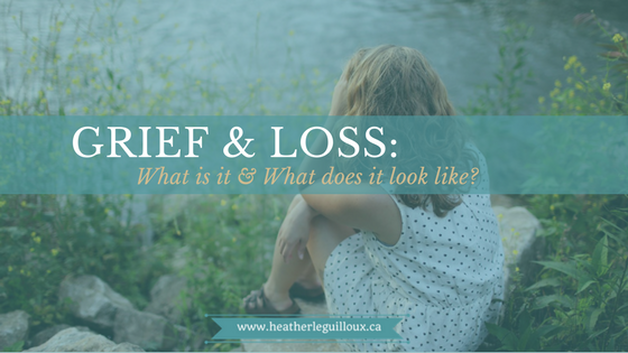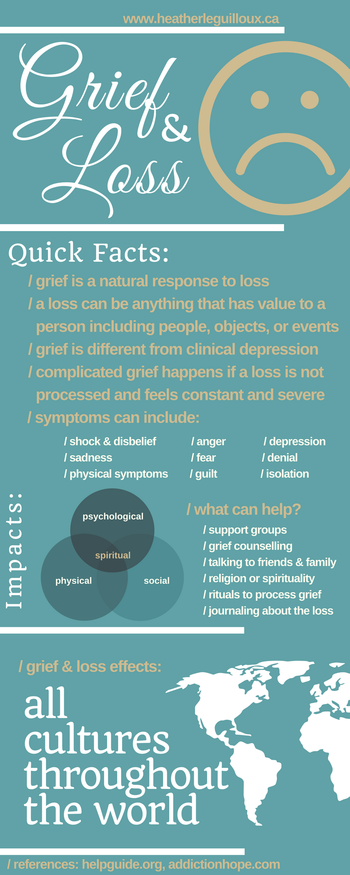|
|Understandably, grief and loss can be a difficult topic to read about and so, while I highly appreciate your time, if you have experienced a loss recently, or are experiencing a tough time, please be mindful of your own emotions and well-being as some of the information in the post and series may be tough to read while in the midst of your own experience of loss.
MENTAL HEALTH RESOURCE VAULTGreat!Check your email for instructions on how to access the Mental Health Resource Vault. Grief & Loss: What is it & What does it look like?
The first post in this series focusing on grief and loss interviewed Connie on the Bloggers Corner, who is a blogger was been personally impacted by loss and has transformed her grief into a passion for supporting others and helping to prevent suicide. It can be very difficult to share a story of loss, no matter how much time has passed, and I sincerely thank Connie for being able to share her story with us.
In this post, we will explore the definition of grief and the symptoms associated with a response to loss. Other posts in this series include: First Experience of Loss
Before we explore the definition of grief, let's explore your very first experience of loss. If you are feeling able, ask yourself:
My first experience of loss happened to be the loss of my pet bunny rabbit named BunBun (actual name). He went missing one day and never returned. I clearly remember this event, but at the time I did not have and adequate understanding of what loss actually means; the finality of losing something so dear to you. I can recall the questions that came to mind about what happened to BunBun and the consequences of not finding him ever again. I remember the rush of sadness when I found out that he may never return and the deep pit of despair to think that I had lost my very first best friend. I really loved animals back then, and still do now. I can recall the sadness that I felt and the tears that streamed down my face a week later when the realization that BunBun was never to return. Despite the fact that this loss happened so long ago, this memory is still so fresh in my mind, and it's an example of how strong the sense of loss can be and that we can carry these feelings with us far into future. Therefore, it can help to have an understanding of the process of loss in order to work through the stages of grief as a way of dealing with the pain of loss. Now that we have explored an experience of loss, what exactly is grief? According to helpguide.org: "Grief is a natural response to loss [and is] the emotional suffering you feel when something or someone you love is taken away."
Causes
My example of loss above included several causes that led to my experience of grief including the loss of a friendship as well as a bereavement or death. There are many other causes that could trigger a loss including:
Essentially the loss of anything that an individual has attributed meaning to can trigger the grieving process. Therefore, it is important to carefully consider how an individual may experience this loss, especially those who may not be able to articulate just how much pain their grief is causing. Symptoms
Each person will experience a loss in a different way, and the severity of symptoms may also depend on the amount of value or meaning the loss had in their life.
A few things to remember about grief:
Many people may have heard of the five stage model first introduced by psychiatrist Elisabeth Kubler-Ross consisting of denial, anger, bargaining, depression, and finally acceptance. These stages are not intended to be linear, nor does everyone who experiences grief move through all, or any, of the stages. The grieving process is a complex and unique process and it's okay to experience different symptoms or stages than others. Other symptoms of grief can include:
Learn about the science of heartbreak: Additional Reading:
References: onlyhealthy.com, helpguide.org, addictionhope.com
The links in this article may be affiliate links that I will be compensated for at no additional cost to you. Want to start your own blog? Click here to learn how!
14 Comments
5/16/2017 12:32:17 am
The distinctions you make between grief and loss are super helpful. My first experience of loss was when my puppy was run over by my much loved teacher. Every day school started by us lining up outside (we were a very small country school). I remember crying, and being asked what was wrong. I screamed out, "Mr Duffy killed my dog!" He died himself not long after. I still think of him some 35 years later. He was a truly caring man and I bet he felt terrible for what happened.
Reply
5/17/2017 11:12:33 am
Thank you for your comment, Kate. It's interesting how an experience of loss can stay with us even after so many years have passed. I'm glad that the post was helpful in distinguishing between loss and grief, as well. Take good care!
Reply
5/17/2017 05:20:38 am
Great post. Ive been grieving this year the loss of a friendship and it's been very impactful. Getting clear as you say in recognizing is so important.
Reply
5/17/2017 11:14:28 am
I'm sorry to hear of the loss of your friendship, Stefanie.. it can be really tough to go through losing such a close connection with another person. I hope you're taking good care of yourself and check back in the next few weeks - I'll be posting two more articles on the topic of grief and loss including strategies to help cope.
Reply
I really liked how detailed this post is, the causes, symptoms, definitions, and the distinction between grief and loss. I find it very helpful. The infographic is very useful and a great resource as it sums up everything you wrote quite neatly. Thanks gor sharing this!
Reply
5/17/2017 11:15:03 am
Thanks for your comment, Andres! I'm glad the post was helpful for you. :)
Reply
5/19/2017 12:44:23 pm
This post is both very informative and sensitively written. I am very interested in psychology and finding out the reasons we think and do things in our lives, so this was very interesting for me.
Reply
5/20/2017 05:47:52 pm
Hi Mishelle, thank you for your comment! If you're interested in psychology and mental health, you've come to the right blog! Check out my previous articles on anxiety and depression and sign up for my newsletter for updates on blog topics and the latest posts in the future. Take care!
Reply
5/20/2017 05:48:27 pm
So glad the article was helpful, Babette.. take care!
Reply
5/19/2017 03:10:50 pm
phenomenal post. so much to learn in this area. love the infographic.
Reply
5/20/2017 05:49:35 pm
Thank you, Sasha! I have two more articles on the topic coming to the blog soon because there is a lot to cover. Feel free to share the infographic, as well. Take care!
Reply
3/10/2020 01:15:23 pm
I'm glad this article was helpful for you. Be sure to read the other articles on the topic of grief available on the blog, as well.
Reply
Your comment will be posted after it is approved.
Leave a Reply. |
Welcome to the blog!↓ That's me, Heather. :)
MENTAL HEALTH RESOURCE VAULTGreat!Check your email for instructions on how to access the Mental Health Resource Vault. Categories
All
Popular Posts// 25 Positive Mindset Quotes
// Self-Care Bullet Journal Spreads // 7 Ways Your Physical Health is Connected to Your Mental Health |








 RSS Feed
RSS Feed
















